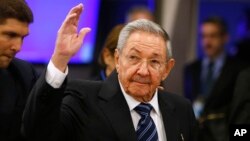A full normalization of ties between the U.S. and Cuba will not occur, says Cuban leader Raul Castro, until the U.S. lifts the trade embargo, ends its “illegal” occupation at the Guantanamo Bay military base, stops “destabilizing” broadcasts to Cuba and compensates Cubans for economic damages.
In his first ever speech at the United Nations General Assembly, President Castro said his government would continue to introduce a draft resolution against the U.S. trade embargo at the U.N. as long as the embargo remained in place.
U.S. President Barack Obama has voiced support for lifting the embargo, a procedure that would require congressional action.
Earlier Monday, President Obama told the U.N. that while the U.S. continues to have “differences” with Cuba, on issues such as human rights, these differences would now be addressed through channels that included diplomatic relations.
“Change won’t come overnight to Cuba,” said Obama.
President Obama said he was confident that “openness, not coercion” would “support the reforms and better life the Cuban people deserve.”
The president drew applause when he said he was confident that Congress would eventually lift the trade embargo.
Meeting on the Sidelines
President Obama and Castro are set to meet on the sidelines of the U.N. General Assembly, on Tuesday, their second meeting this year.
The two leaders sat down for talks, in April, during the Summit of the Americas in Panama.
Earlier this year, Cuba and the U.S. reopened their embassies. Cuba announced that Jose Cabanas, a veteran diplomat, would serve as the country’s first ambassador to the U.S. in over half a century. The U.S. has not named its ambassador yet.
Pope Francis hailed the U.S. and Cuba’s efforts to restore relations, last week, during his visit to the island nation, calling it an “example of reconciliation for the entire world."
During his speech, President Castro also addressed conflicts in other regions of the world, including the civil unrest in Syria.
He said the Syrian people were “capable of resolving their disputes by themselves” and demanded the end to what he called “external interference” in the country.
In terms of the Israeli – Palestinian conflict, he said a “fair and lasting solution” would require allowing Palestinians to exercise their “inalienable right” to build their own state, with a capital in East Jerusalem.




